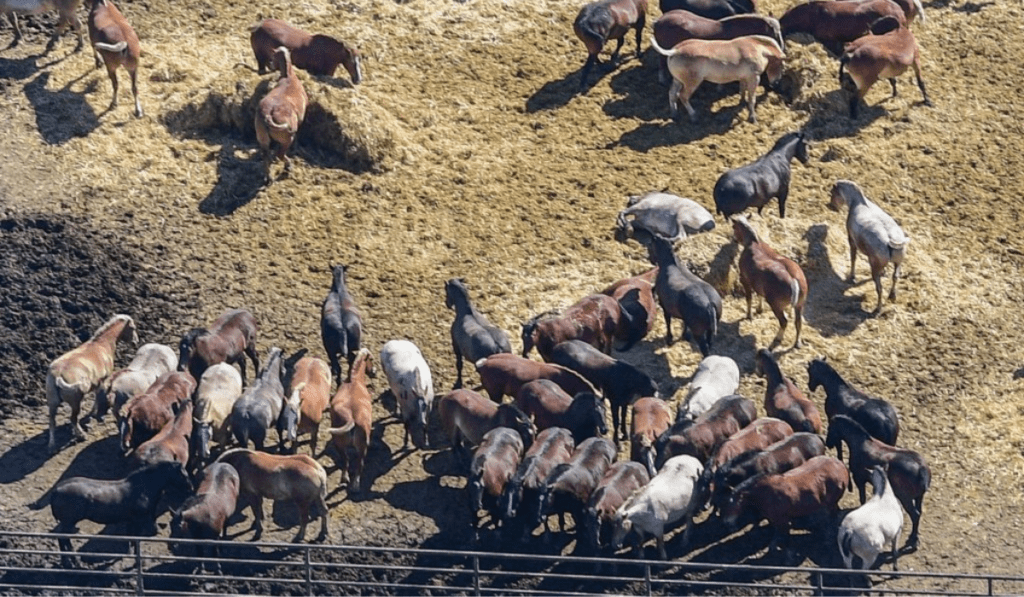Article originally published in the Daily Hive. Written by Chantelle Archambault of the Vancouver Humane Society and Kaitlyn Mitchell, a lawyer and director of legal advocacy with Animal Justice.
Animal lovers across Canada came together this week for a day of action to call out the Senate’s delay in passing a bill to end the export of live horses from Canada for slaughter overseas.
The unified message from thousands of individuals from coast to coast to coast on October 22 was that Canadians want to see this heinous practice stop. Senators need to stop horsing around and move forward with Bill C-355, which has passed the House of Commons but has been languishing in the Senate with little progress since May.
Hope was in sight last September when Liberal MP Tim Louis introduced Bill C-355. The private member’s bill follows the federal Liberals’ campaign promise during the 2021 election to finally ban the controversial practice of shipping horses on stressful journeys to slaughter – a promise reiterated by the prime minister in his mandate letter to the Minister of Agriculture that December.
But since then, more than 6,000 horses have been loaded onto airplanes and shipped to their deaths in a horrific betrayal – betrayal of the trust of many voters who considered animal welfare a priority in their election day decision; betrayal of the gentle and sensitive animals whom many people consider to be close companions; and betrayal of the compassionate values of most Canadians. In fact, recent polling shows only 22% of Canadians are in support of the live horse export industry continuing.

For more than a decade, animal protection groups and the Canadian public have been raising the alarm about the long and gruelling journey horses endure when they are sent from Canadian feedlots to Japan for slaughter. These sensitive animals with strong fight-or-flight instincts are carted to airports in Edmonton and Winnipeg in the dead of night, as far from the public eye as possible. They are packed in wooden crates, typically with three or four horses in a single crate, regardless of their social compatibility. They can wait for hours on the noisy tarmac before being loaded onto planes.
Legally, horses can go up to 28 hours without food, water, or rest on these stressful overseas trips. Two new exposés by Animal Justice and Japanese animal advocacy group Life Investigation Agency (LIA) show that the suffering these horses endure is far worse than previously imagined and completely at odds with claims made by industry representatives. The industry regularly violates Canadian transport laws with impunity.

In the first exposé, released this past June, the groups documented how long it takes for horses to be given access to food, water, and an opportunity to rest after they land in Japan. Contrary to industry and Canadian Food Inspection Agency (CFIA) claims, the horses did not arrive at the quarantine feedlots until up to six and a half hours after landing. This suggests that all shipments from Winnipeg, and approximately 60% of those from Edmonton, likely go over the 28-hour legal limit. The groups’ footage also showed horses routinely sprayed with harsh disinfectant chemicals as they arrived at the quarantine facility. The horses are so dehydrated that some try to lick the painful chemicals off the nets of the transport truck.
And it’s not just transport times that have been lowballed. The group’s second exposé, released last month, revealed Government of Japan records showing that the number of horse deaths, illnesses, and injuries associated with export far exceeds what Canadian regulators have previously indicated.
Between May 2023 and June 2024 alone, at least 21 horses shipped from Canada died during transport to Japan or in the hours and days after landing. More than 50 more animals sustained injuries and illnesses. Horses exported for slaughter are dying prolonged and painful deaths caused by dehydration, severe injuries sustained by falling on the flights, and even agonizing miscarriages.
The truth about the horse export industry has come out, and it is an ugly truth.
Given the horrific realities faced by horses shipped for slaughter, it’s no wonder that the government’s deadly delay weighs so heavily on the hearts of Canadians. Now that Bill C-355 has passed the House of Commons, the fate of thousands of horses is in the hands of the Senate – an institution notorious for delaying private members’ bills. With the next federal election looming and partisan showmanship in the political spotlight, now is the time for Senators to heed the will of Canadians before it’s too late.
